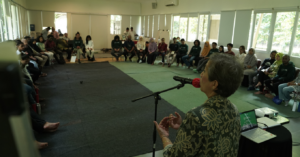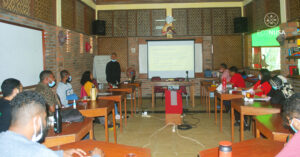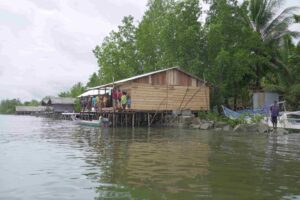
Sunday, 25 Oktober 2020, at 20.15, we arrived at Bacan Island, South Halmahera Regency, Maluku. We would stay the night nearby Babang port. We plan early at 4.30 morning we would head off Sali Kecil Island, East Bacan, as parts of Bacan islets.
Bacan is a separate sultanate as the capital of South Halmahera Regency. The island is known with its Bacan gemstone. It is a precious stone luring enthusiast with costly price when peoples were crazy about gemstone. Bacan Island at its glorious ear produced sugar with its sugar cane factory and plantation. The island also had rubber processing and plantation. Bacan, if it might be said, was one of the islands with its self-reliance at the time.
But now, Bacan should import sugar from outside and even other province. Almost all staple food for the community is imported from other islands. Whereas, this island used to suffice most its needs. The ‘conquest’ of Indonesian island, particularly in the eastern of Indonesia, has been done through food politics by which local residents should rely on food supply from outside which is vulnerable for politicization. Bacan should have been sovereign to meet the need for food. The residents should have been aware that local food production is a must so as not to depend on food sources outside the island.
After staying the night at Babang port in Bacan Island, we arried at Sali Kecil island. There was an ‘old’ village next to a luxurious resort that was once opposed by the local residents. Sali Kecil is sacred island for some peoples in North Maluku. This was the reason for opposing the foreigner-owned deluxe resort.
In this case, not all residents rejected the scheme. It was obviously seen that investment from outside always makes the community split up. Worse, such a process every so often sides with the ruler or businessperson’s interests. Nearly all Sali Kecil dwellers are fishermen and farmers. They have fish-rich ocean. Their islands are full of coconuts trees and spice plantations such as nutmeg and clove.
There is a sacred grave in Sali Kecil Island on the center of the village. The resident said there are many peoples for a devout visit to the grave for ‘asking’ blessing. Many peoples are coming when the regional election is drawing near. Some come for office promotion and other reasons. Sali Kecil is one of important islands in North Maluku. Unfortunately, only few people in the country hear the existence.
From morning, we held a medical check. The village has only one midwife and one health cadre. Having finished the activity at 15.00, we documented the community livelihood and provided supports for farming and food resilience. All team members went onboard to prepare the next itinerary.
When the machine was on, the ship did not move. In fact, the anchor on the 150 meters depth got stuck on something. It took almost two hours for the ship to lift up the anchor but to no avail. The rope was eventually taken out, but the 150 kilograms anchor remained at the seabed. The rope connecting to the anchor was cut off. We should let go off the anchor to continue to the next destination.
Editor: Leo Wahyudi







